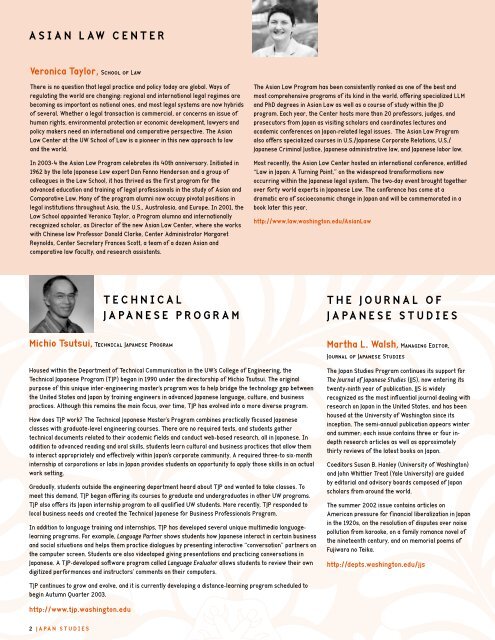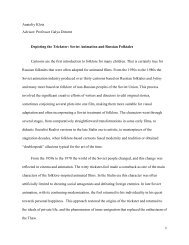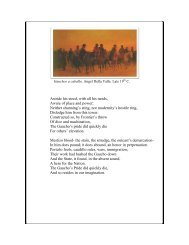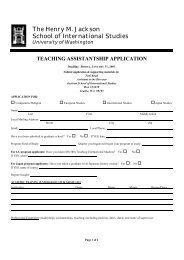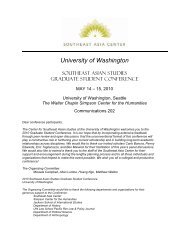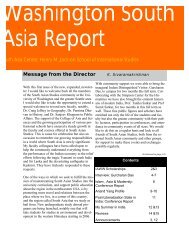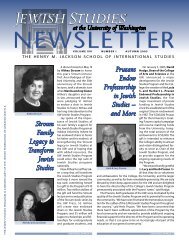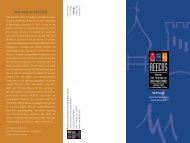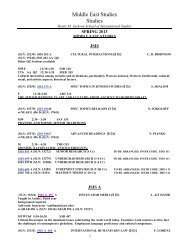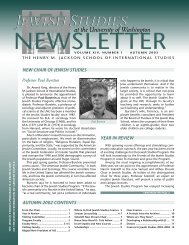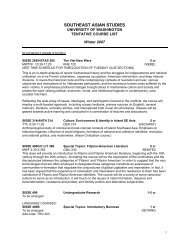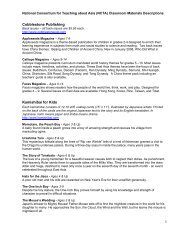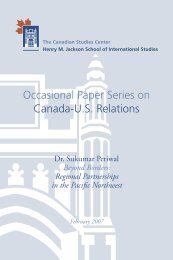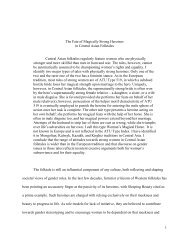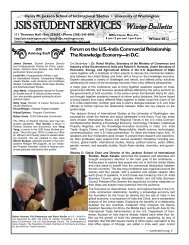FROM THE CHAIR - Jackson School of International Studies ...
FROM THE CHAIR - Jackson School of International Studies ...
FROM THE CHAIR - Jackson School of International Studies ...
You also want an ePaper? Increase the reach of your titles
YUMPU automatically turns print PDFs into web optimized ePapers that Google loves.
ASIAN LAW CENTER<br />
Veronica Taylor, <strong>School</strong> <strong>of</strong> Law<br />
There is no question that legal practice and policy today are global. Ways <strong>of</strong><br />
regulating the world are changing: regional and international legal regimes are<br />
becoming as important as national ones, and most legal systems are now hybrids<br />
<strong>of</strong> several. Whether a legal transaction is commercial, or concerns an issue <strong>of</strong><br />
human rights, environmental protection or economic development, lawyers and<br />
policy makers need an international and comparative perspective. The Asian<br />
Law Center at the UW <strong>School</strong> <strong>of</strong> Law is a pioneer in this new approach to law<br />
and the world.<br />
In 2003-4 the Asian Law Program celebrates its 40th anniversary. Initiated in<br />
1962 by the late Japanese Law expert Dan Fenno Henderson and a group <strong>of</strong><br />
colleagues in the Law <strong>School</strong>, it has thrived as the f irst program for the<br />
advanced education and training <strong>of</strong> legal pr<strong>of</strong>essionals in the study <strong>of</strong> Asian and<br />
Comparative Law. Many <strong>of</strong> the program alumni now occupy pivotal positions in<br />
legal institutions throughout Asia, the U.S., Australasia, and Europe. In 2001, the<br />
Law <strong>School</strong> appointed Veronica Taylor, a Program alumna and internationally<br />
recognized scholar, as Director <strong>of</strong> the new Asian Law Center, where she works<br />
with Chinese law Pr<strong>of</strong>essor Donald Clarke, Center Administrator Margaret<br />
Reynolds, Center Secretary Frances Scott, a team <strong>of</strong> a dozen Asian and<br />
comparative law faculty, and research assistants.<br />
TECHNICAL<br />
JAPANESE PROGRAM<br />
Michio Tsutsui, Technical Japanese Program<br />
The Asian Law Program has been consistently ranked as one <strong>of</strong> the best and<br />
most comprehensive programs <strong>of</strong> its kind in the world, <strong>of</strong>fering specialized LLM<br />
and PhD degrees in Asian Law as well as a course <strong>of</strong> study within the JD<br />
program. Each year, the Center hosts more than 20 pr<strong>of</strong>essors, judges, and<br />
prosecutors from Japan as visiting scholars and coordinates lectures and<br />
academic conferences on Japan-related legal issues. The Asian Law Program<br />
also <strong>of</strong>fers specialized courses in U.S./Japanese Corporate Relations, U.S./<br />
Japanese Criminal Justice, Japanese administrative law, and Japanese labor law.<br />
Most recently, the Asian Law Center hosted an international conference, entitled<br />
“Law in Japan: A Turning Point,” on the widespread transformations now<br />
occurring within the Japanese legal system. The two-day event brought together<br />
over forty world experts in Japanese Law. The conference has come at a<br />
dramatic era <strong>of</strong> socioeconomic change in Japan and will be commemorated in a<br />
book later this year.<br />
http://www.law.washington.edu/AsianLaw<br />
Housed within the Department <strong>of</strong> Technical Communication in the UW’s College <strong>of</strong> Engineering, the<br />
Technical Japanese Program (TJP) began in 1990 under the directorship <strong>of</strong> Michio Tsutsui. The original<br />
purpose <strong>of</strong> this unique inter-engineering master’s program was to help bridge the technology gap between<br />
the United States and Japan by training engineers in advanced Japanese language, culture, and business<br />
practices. Although this remains the main focus, over time, TJP has evolved into a more diverse program.<br />
How does TJP work? The Technical Japanese Master’s Program combines practically focused Japanese<br />
classes with graduate-level engineering courses. There are no required texts, and students gather<br />
technical documents related to their academic fields and conduct web-based research, all in Japanese. In<br />
addition to advanced reading and oral skills, students learn cultural and business practices that allow them<br />
to interact appropriately and effectively within Japan’s corporate community. A required three-to six-month<br />
internship at corporations or labs in Japan provides students an opportunity to apply those skills in an actual<br />
work setting.<br />
Gradually, students outside the engineering department heard about TJP and wanted to take classes. To<br />
meet this demand, TJP began <strong>of</strong>fering its courses to graduate and undergraduates in other UW programs.<br />
TJP also <strong>of</strong>fers its Japan internship program to all qualified UW students. More recently, TJP responded to<br />
local business needs and created the Technical Japanese for Business Pr<strong>of</strong>essionals Program.<br />
In addition to language training and internships, TJP has developed several unique multimedia languagelearning<br />
programs. For example, Language Partner shows students how Japanese interact in certain business<br />
and social situations and helps them practice dialogues by presenting interactive “conversation” partners on<br />
the computer screen. Students are also videotaped giving presentations and practicing conversations in<br />
Japanese. A TJP-developed s<strong>of</strong>tware program called Language Evaluator allows students to review their own<br />
digitized performances and instructors’ comments on their computers.<br />
TJP continues to grow and evolve, and it is currently developing a distance-learning program scheduled to<br />
begin Autumn Quarter 2003.<br />
http://www.tjp.washington.edu<br />
2 JAPAN STUDIES<br />
<strong>THE</strong> JOURNAL OF<br />
JAPANESE STUDIES<br />
Martha L. Walsh, Managing Editor,<br />
Journal <strong>of</strong> Japanese <strong>Studies</strong><br />
The Japan <strong>Studies</strong> Program continues its support for<br />
The Journal <strong>of</strong> Japanese <strong>Studies</strong> (JJS), now entering its<br />
twenty-ninth year <strong>of</strong> publication. JJS is widely<br />
recognized as the most influential journal dealing with<br />
research on Japan in the United States, and has been<br />
housed at the University <strong>of</strong> Washington since its<br />
inception. The semi-annual publication appears winter<br />
and summer; each issue contains three or four indepth<br />
research articles as well as approximately<br />
thirty reviews <strong>of</strong> the latest books on Japan.<br />
Coeditors Susan B. Hanley (University <strong>of</strong> Washington)<br />
and John Whittier Treat (Yale University) are guided<br />
by editorial and advisory boards composed <strong>of</strong> Japan<br />
scholars from around the world.<br />
The summer 2002 issue contains articles on<br />
American pressure for f inancial liberalization in Japan<br />
in the 1920s, on the resolution <strong>of</strong> disputes over noise<br />
pollution from karaoke, on a family romance novel <strong>of</strong><br />
the nineteenth century, and on memorial poems <strong>of</strong><br />
Fujiwara no Teika.<br />
http://depts.washington.edu/jjs


